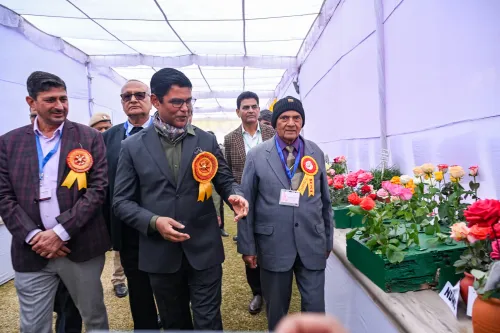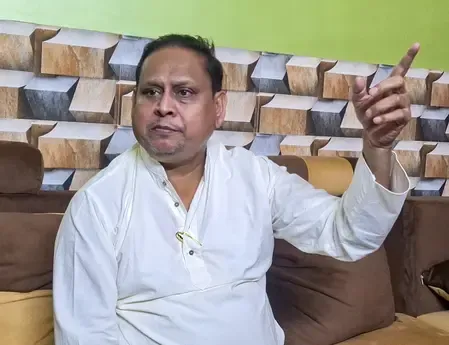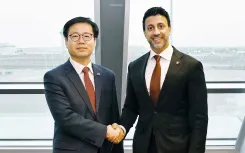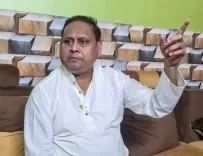Congress Reclaims Patel's Gandhian Values, Confronts BJP's Narrative
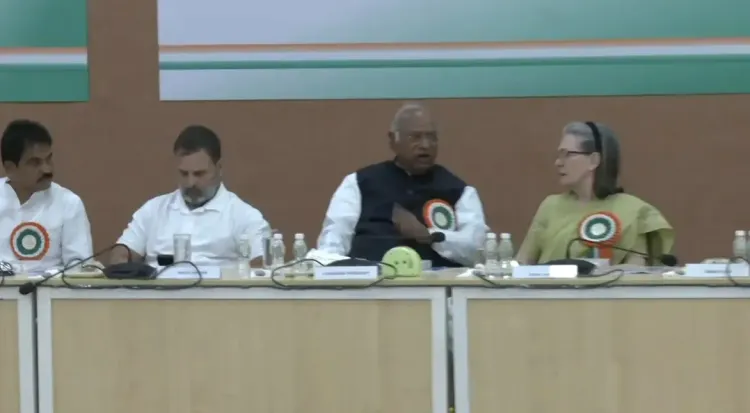
Synopsis
Key Takeaways
- Congress aims to reconnect with Sardar Patel's legacy.
- The party's resolution highlights Patel's commitment to secularism and unity.
- Gujarat has a complex political history with Congress.
- Patel's values are deemed essential in today's political context.
- Congress seeks to counter BJP's appropriation of Patel's narrative.
Ahmedabad, April 9 (NationPress) The Congress Party’s political assembly on the banks of the Sabarmati River transcended a mere routine meeting; it symbolized a profound return to the land that nurtured one of its most prominent figures, Sardar Vallabhbhai Patel.
The two-day All India Congress Committee (AICC) session in Ahmedabad was a strategic initiative to reaffirm the party’s bond with Patel’s lasting legacy in Gujarat—a legacy that has been increasingly eclipsed by competing political narratives.
On the occasion of Patel’s 150th birth anniversary and the 75th anniversary of his passing, Congress adopted a comprehensive resolution titled “Flag Bearer of Freedom Movement -- Our Sardar -- Vallabhbhai Patel”.
This resolution honored not only Patel’s accomplishments as India’s first Deputy Prime Minister and Home Minister but also aimed to reclaim the ideological territory he embodied—a territory Congress asserts has been wrongfully appropriated in recent years.
“We are gathered here not just to commemorate Sardar Patel but to remind the nation of the principles he genuinely represented—secularism, unity, and inclusive nation-building,” stated Congress President Mallikarjun Kharge during the proceedings.
“There is an effort to distort history. Patel was fundamentally a Gandhian.” The location itself bore immense significance.
The Sabarmati Ashram and the adjacent Sardar Smarak are rich in the memories of India’s freedom struggle. From these very grounds, Gandhi and Patel launched numerous revolutionary movements—Kheda, Bardoli, and Salt Satyagraha.
These historical echoes resonated with the members of the Congress Working Committee (CWC), who convened in full attendance, including Sonia Gandhi, Rahul Gandhi, and Priyanka Gandhi Vadra, eager to draw inspiration from the past to reposition their party for the future.
Born in 1875 in Nadiad, Gujarat, Vallabhbhai Patel emerged from a modest agrarian background. Educated as a barrister in London, he returned to India not to chase a lucrative legal career but to serve his nation.
His leadership during the Kheda Satyagraha of 1918, where he championed the rights of farmers against unjust British taxation during a famine, marked his emergence on the national stage. It was in Bardoli that he earned the title “Sardar” for his unwavering determination and organizational prowess.
After Independence, Patel’s pivotal role in unifying over 560 princely states into the Indian Union stands as a monumental achievement in modern diplomacy. He was both pragmatic and principled, resilient yet deeply rooted in Gandhian ideals.
“There is something exceptional in this soil, which despite numerous challenges has always remained the home of great souls,” Patel once remarked about Gujarat—a sentiment that resonates today as Congress seeks to re-establish itself in this region.
For Congress, reclaiming Patel is not solely about historical acknowledgment but also about political rectification.
Over the past two decades, the BJP has actively invoked Patel’s legacy, often contrasting him with Nehru to advance its ideological objectives. Prime Minister Narendra Modi has frequently positioned Patel as the true architect of modern India, culminating in the 2018 unveiling of the Statue of Unity in Kevadia, the tallest statue in the world. This appropriation has left Congress on the defensive, even though Patel was one of its most devoted leaders.
The AICC resolution strives to clarify the record. It underscores Patel’s commitment to secularism, his staunch opposition to communalism, and his efforts to protect India’s democratic structure—elements that starkly contrast with the narratives currently projected in his name.
The resolution also conveys a broader ideological message. It recalls that Patel banned the Rashtriya Swayamsevak Sangh (RSS) following Mahatma Gandhi’s assassination in 1948, emphasizing the primacy of constitutional values over religious identity in public life.
“The principles Patel fought for are the very principles we must defend today—values that are being systematically undermined,” remarked senior Congress leader Jairam Ramesh during the session.
The state of Gujarat has a complicated relationship with Congress. Once a bastion of the party, Gujarat has not seen a Congress government since 1995. The BJP's rise has been meteoric, heavily relying on cultural pride, development politics, and historical symbolism. Patel has played a central role in this narrative.
For Congress, returning to Gujarat is not merely a symbolic act; it is a pressing political imperative. The Sabarmati meeting also occurs at a time when the party is striving to rebuild its base, strengthen grassroots connections, and challenge the BJP's dominance leading up to the 2024 elections.
The Congress hopes that invoking Patel—truthfully and contextually—will assist in re-aligning it with the people of Gujarat, many of whom continue to hold Patel in high regard.
In its resolution, Congress has made a deliberate effort to align Patel’s values with its contemporary political vision—defending federalism, resisting authoritarianism, and restoring trust in democratic institutions.
The resolution does not merely reflect on the past; it offers a roadmap for ideological struggle, stressing economic justice, secular governance, and constitutional morality. Whether this will translate into electoral success in Gujarat remains uncertain. However, it is evident that Congress is no longer willing to relinquish Patel’s legacy without a battle.
As the sun set over the Sabarmati on the final day of the convention, party members lit diyas in the spirit of unity and remembered Patel not only as the “Iron Man of India” but as a Gandhian nationalist whose true strength lay in uniting people rather than dividing them. For a party seeking revival, his legacy may indeed be the guiding light.


